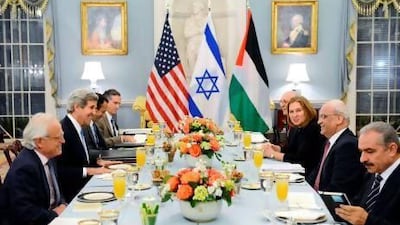RAMALLAH & WASHINGTON // The US secretary of state John Kerry said yesterday that Israelis and Palestinians had resumed negotiations over core issues and aimed to reach a peace deal within nine months.
The announcement signalled a breakthrough in his efforts to cajole both sides back to the negotiating table after a three-year hiatus in peace talks.
In another sign of progress, the US president, Barack Obama, met yesterday with Israeli and Palestinian peace envoys before their second day of talks in Washington.
"The president used this opportunity to convey his appreciation to both sides for the leadership and courage they have shown in coming to the table," White House spokesman Jay Carney said.
The negotiating parties had decided it was best not to elaborate on the details of what was discussed, said Mr Carney.
Mr Kerry said both sides had "agreed that all of the final status issues, core issues and other issues are on the table for negotiations".
Negotiations on those issues - Jerusalem, borders, Israeli settlements and Palestinian refugees - would last nine months until a final agreement was brokered, Mr Kerry said.
"I can assure you that in these negotiations, it's not our intention to argue about the past, but to create solutions and make decisions for the future," Israel's justice minister and peace envoy Tzipi Livni told her Palestinian counterpart, Saeb Erakat.
"No one benefits more from the success of this endeavour than Palestinians. It's time for the Palestinian people to have an independent sovereign state of their own."
After six trips to the region this year, Mr Kerry succeeded in getting both sides to meet in Washington on Monday and again yesterday to lay the groundwork for negotiations on the divisive issues of the conflict.
Attending those meetings were Ms Livni and Yitzhak Molcho, a close aide to the Israeli prime minister, Benjamin Netanyahu. The Palestinians were represented by Mr Erekat and his deputy, Mohammed Shtayeh.
Mr Kerry has repeatedly praised the US president for his efforts to renew peace efforts. On Monday, he credited Mr Obama for persuading both sides to fly to Washington for the meetings.
"Without his commitment, without his conversations there and without his engagement in this initiative, we would not be here today," Mr Kerry said.
Yet, for the most part, Mr Obama has remained uncharacteristically aloof in his administration's renewed effort to resolve the Israeli-Palestinian conflict, which may be as much about his faith in his top diplomat as it is concern about wading into a thorny issue that got the better of him during his first presidential term.
In late 2010, Mr Obama succeeded in getting Mahmoud Abbas, president of the Palestinian Authority, and Mr Netanyahu to resume negotiations.
But those talks broke down three weeks after starting, primarily because Mr Netanyahu refused to stop constructing Jewish settlements on territory the Palestinians want for their state.
The swift collapse of those negotiations was embarrassing for Mr Obama, whose relationship with Mr Netanyahu quickly soured afterwards.
Moreover, the efforts he made to get them started - including Israel's agreement to a partial settlement-construction freeze - put him at odds with Congressional Republicans who have lent unswerving support to the Israeli government.
Worried about the domestic political capital that could be lost by taking on Israeli-Palestinian issues, Mr Obama appears to be letting Mr Kerry sort out the nitty-gritty.
"You don't want to waste presidential capital," said Aaron David Miller, a veteran US adviser in the Israeli-Palestinian peace process.
Still, he supported Mr Obama's hands-off approach but warned that the US leader would have to eventually step in to the talks "if it's going to succeed".
* Additional reporting by the Associated Press and Agence France-Presse

